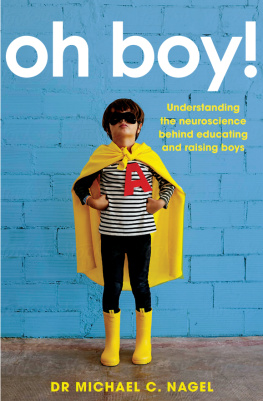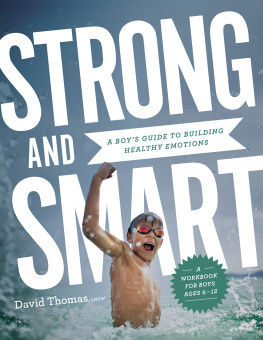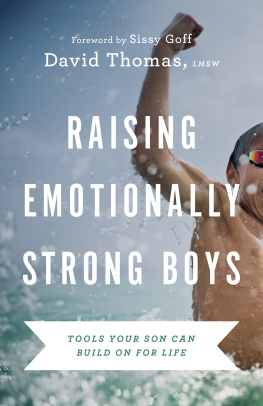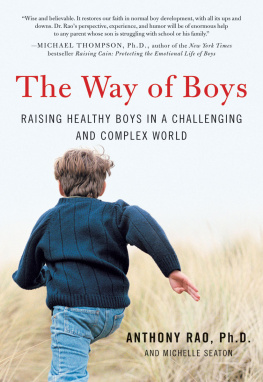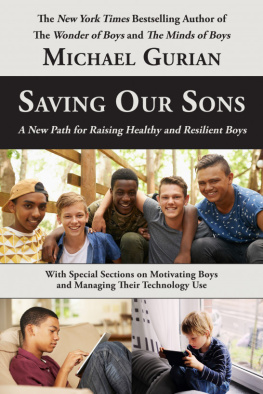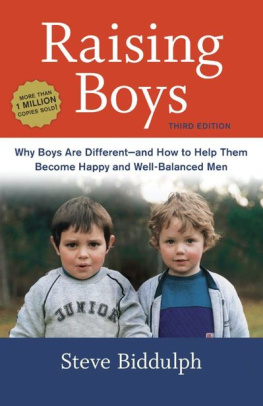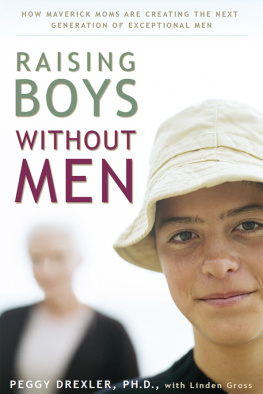About the Author
Jane Jacobs was a journalist who became a leading authority on urban planning. When she was asked about her training, she replied that it came from sitting on her front porch in Greenwich Village, New York, and watching what was happening to the city around her. For thirty years, my front porch was my classroom, and for another ten years it was my counselling room. I have no formal training in psychology or pediatrics, but I have worked closely with thousands of boys over the course of my career as a teacher and mentor. I have listened to countless boys stories, I have given a lot of thought to my own story, and I raised three boys.
I was born in 1959 and came to consciousness in the late 1960s, a time when the whole world seemed to be exploding into something new. When the dust began to settle, the group that came out of it best seemed to be women. They had totally redefined their place in the world and were permitted new ways of being. Nothing like this happened for men and boys.
I did not fit the stereotype for my gender. I was a highly sensitive boy growing up in small-town Ontario where hockey was the main socially sanctioned activity for self-definition and self-presentation . I faked an interest in hockey. My loves were writing and drawing, which I did in secret. I knew what it was to live in fear of being teased. I learned to hide, to camouflage, to deny. Like many boys, I put parts of myself away. I had a complex relationship with my mother that veered between intense attachment and hostile separation. My father was a mysterious, distant enigma scarred by death, alcoholism, and war. I loved them both intensely. I liked being a boy. I spent most of my time outside in a maple tree beside our house. I liked my boy energy, but, as I grew up, I began to feel the limits put on it.
As an adult, psychoanalysis and psychotherapy taught me to accept my unique nature, and the womens movement showed that it was possible to change society. I became the father of three boys with few reference points on how to do this. Over time, I came to specialize in working with boys to affirm their unique natures and their male energy all beautiful, powerful, and mysterious. Their emotional health is our hope. I am particularly drawn to those boys who do not fit in round pegs trying to fit into square holes. Whether its problems with paying attention at school, language processing, sensory processing, anxiety, or high sensitivity, I remember how these things felt.
After all my years of working with kids, of reflection, and of research, and now that my own children have grown up and moved away, I have come to the conclusion that every child needs three things:
- To be seen for who they really are
- To be listened to no matter what they say
- To be touched with nurturing affection
As a society, we are now on the verge of a complete redefinition of what it means to be male. Men must change or be left behind. They have no choice. This will not mean abandoning male energy. It will mean embracing it in all its complexity rather than keeping it in the narrow box into which it has always been crammed. We need men with empathy to assume leadership in the project of raising emotionally healthy boys. We need men who will expand the definition of what it means to be male in their own lives. We need men who will tell their truth.
Bibliography
Abrams, Jeremiah, ed. Reclaiming the Inner Child . Los Angeles: Jeremy Tarcher, 1990.
Adams, Kenneth. Silently Seduced: When Parents Make Their Children Partners . Deerfield Beach, FL: Health Communications, 1991.
American Psychiatric Association. Diagnostic and Statistical Manual of Mental Disorders DSM-5 . Arlington, VA: American Psychiatric Publishing, 2013.
Aron, Elaine. The Highly Sensitive Child . New York: Harmony Books, 2002.
___. The Highly Sensitive Person . New York: Harmony Books, 1997.
Aristotle. Poetics . Toronto: Oxford University Press, 2013.
Axline, Virginia Mae. Play Therapy: The Inner Dynamics of Childhood . Hesperides Press, 2011.
Ayres, Jean. Sensory Integration and the Child . Torrance, CA: WPS Publishing, 2005.
Barkley, Russell A. and Christine Benton. Your Defiant Child . New York: Guilford Press, 2013.
___. Your Defiant Teen. New York: Guilford Press, 2013.
Baron-Cohen, Simon. The Essential Difference: Male and Female Brains and the Truth About Autism . Toronto: Penguin Books, 2012.
Beck, Judith. Cognitive Therapy: Basics and Beyond . New York: The Guilford Press, 1995.
Bettelheim, Bruno. A Good Enough Parent . London: Pan Books, 1988.
Blake, William. The Complete Poetry & Prose of William Blake . New York: Anchor Books, 1997.
Bly, Robert . Iron John: A Book About Men . New York: Vintage Books, 1992.
Brizendine, Louann. The Female Brain . New York: Harmony Books, 2007.
___. The Male Brain . New York: Harmony Books, 2011.
Cain, Susan. Quiet: The Power of Introverts in a World that Cant Stop Talking . New York: Broadway Books, 2013.
Campbell, Joseph. The Power of Myth . New York: Anchor Books, 1991.
Carnes, Patrick. Out of the Shadows: Understanding Sexual Addiction . Center City, MN: Hazelden, 2001.
Coloroso, Barbara. Kids Are Worth It: Raising Resilient Responsible Compassionate Kids . Toronto: Penguin Canada, 2010.
Corneau, Guy. Absent Fathers, Lost Sons: The Search for Masculine Identity . Boston: Shambhala, 1991.
Diamond, Jed. The Irritable Male Syndrome: Understanding and Managing the 4 Key Causes of Depression and Aggression . Emmaus, PA: Rodale Books, 2004.
Dweck, Carol. Mindset: The New Psychology of Success . New York: Ballantine Books, 2007.
Faber, Adele and Elaine Mazlish. How To Talk So Kids Will Listen and Listen So Kids Will Talk. New York: Scribner, 2012.
___. Siblings Without Rivalry . New York: Norton, 2012.
Fox, Matthew. Original Blessing . New York: Tarcher/Putnam, 2000.
Frankl, Viktor. Mans Search for Meaning . Boston: Beacon Press, 2006.
Friedberg, Robert and Jessica McClure. Clinical Practice of Cognitive Therapy with Children and Adolescents: The Nuts and Bolts . New York: The Guilford Press, 2002.
Furth, Gregg. The Secret World of Drawings: A Jungian Approach to Healing Through Art . Toronto: Inner City Books, 2002.
Gibson, Joel. Sexless in the City: A Gender Revolution. The Syndney Morning Herald . March 12, 2010.
Glasser, William. Positive Addiction. New York: Harper Collins, 2010.
Granic, Isabela, Adam Lobel, and Rutger Engels. The Benefits of Playing Video Games. American Psychologist . January 2014.
Grubman-Black, Stephen. Broken Boys/Mending Men: Recovery from Childhood Sexual Abuse . Blue Ridge Summit, PA: Tab Books, 1990.
Gurian, Michael. Boys and Girls Learn Differently . New York: Jossey-Boss, 2010.
___. The Wonder of Boys . New York: Tarcher, 2006.
Hallowell, Edward and John Ratey. Delivered From Distraction . New York: Ballantine Books, 2005.
Hollis, James. The Middle Passage: From Misery to Meaning in Midlife . Toronto: Inner City Books, 1993.
___. Swamplands of the Soul: New Life in Dismal Places . Toronto: Inner City Books, 1996.
___. Under Saturns Shadow: The Wounding and Healing of Men . Toronto: Inner City Books, 1994.
Hui, Ann. Canadian Teens Lead Developed World in Cannabis Use: Unicef Report. The Globe and Mail . April 15, 2013.
Jung, Carl Gustav. The Archetypes and the Collective Unconscious . Trans. R.F.C. Hull. Princeton: Princeton University Press, 1990.
Kranowitz, Carol. The Out-of-Sync Child . New York: Perigee Trade, 2005.
Levant, Ronald. Masculinity Reconstructed . New York: Plume, 1996.
Levy, Ariel. Female Chauvinist Pigs: Women and the Rise of Raunch Culture . New York: Free Press, 2006.


